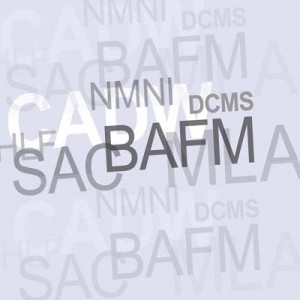 Yesterday the UK Government announced a major overhaul of all non-Governmental bodies. The heritage sector has taken some hits, but thankfully not as many as were predicted.
Yesterday the UK Government announced a major overhaul of all non-Governmental bodies. The heritage sector has taken some hits, but thankfully not as many as were predicted.
The coalition has reviewed the contribution made to UK life and government by 679 quangos (quasi-autonomous non-governmental organisations) who receive Government funding and 222 other statutory bodies.
They decided to do away with almost 200 and to merge 118 with other bodies.
This is all in advance of the largest overhaul of public spending in recent years, which will be announced on Wednesday 20 October.
Does this affect the heritage sector?
Our nation’s museums, archives and libraries fall into this category – they aren’t a part of Government, but many of them receive grants-in-aid from central funds, so there’s been some nervousness about whether this area of our economy would be affected. Of course, there’d have to be a rather dire state of affairs for the Cabinet Office to end funding agreements with the British Museum or the National Archives. But that’s not to say the sector has got off lightly.
The regulars are safe
The national museums – those funded directly by the Department for Culture Media and Sport (DCMS) – are all safe. That’s the big London museums and galleries, plus some anomalies such as Sir John Soane’s Museum, the Horniman Museum and the Wallace Collection.
There’s also no need to worry about the defence museums – the National Army Museum, the National Museum of the Royal Navy and the RAF Museum which, for some reason, are funded directly by the Ministry of Defence, rather than the DCMS. (The debate about whether the experience conflict is part of culture is still raging in the corridors of Whitehall, clearly.) The Royal Botanic Gardens at Kew (funded through Defra) is also safe.
These bodies have all been retained on the grounds that they perform a technical function which should remain independent from Government.
Other DCMS-funded bodies to remain include Historic Royal Palaces and the British Library.
No need to worry
Rumours have been circulating recently about the coalition’s plans for the future of some of the sector-wide bodies. Most have escaped the Cabinet Office’s cuts so far.
Arts Council England and English Heritage – both thought to be headed for change in the future – can carry on business as usual for the time being.
The Big Lottery Fund has also been retained, but responsibility its oversight has been transferred from the DCMS to the Cabinet Office.
The National Heritage Memorial Fund and the Heritage Lottery Fund (HLF) are going to remain as they are for the time being, contrary to rumours in the sector that the HLF at least was going to be swallowed up by English Heritage. The National Lottery Commission, however, will be merged into the Gambling Commission.
The tourism promotion boards Visit Britain and Visit England both survive to fight another day too, perhaps with the aim of trying to boost the nation’s economy through increased incoming tourism activity. Visit England, however, has been told to amend its constitution, however, allowing a wider range of tourist destinations to sit on its board. At present, no heritage or museum professionals sit on the board, so perhaps there will be opportunities for representing the sector more there.
The National Archives (under the umbrella of the Ministry of Justice) has been told that it is safe, but it will be taking on the work of two bodies which are to be declassified – the Advisory Councils on Historic Manuscripts and Public Records. The Advisory Council on National Records and Archives will remain as an independent body, however.
But it’s not all business as usual
Perhaps the biggest news is the declassification of the Museums, Libraries and Archives Council (MLA) which was announced previously, as part of the coalition’s initial cuts to the national budget as soon as they took power. Some functions will be transferred to other bodies.
British Libraries are also likely to be concerned that the Advisory Council on Libraries has also been disbanded.
The recently discussed ship wrecks on the south coast of England may have to work harder now if they still seek to build new museums to hold their treasure, following the announcement that the Advisory Committee on Historic Wreck Sites is to be wound down. Oversight of wrecks in English waters will be transferred to English Heritage, but there are no plans, as yet, for wrecks from the other home countries.
The Advisory Committee on National Historic Ships has been declassified as has the Advisory Committee on the Government Art Collection. The latter of these is to be reconstituted as a committee of experts instead.
Sadly, the last one to go is the Railway Heritage Committee, which will be sadly missed by the sector. The Government claims that heritage items from no other transport sector receive equivalent protection and support from central funds, so this committee should be disbanded. Train spotters and railway heritage enthusiasts across the nation will be up in arms!
A last reprieve
The conservation and lobbying body Natural England (NE) has survived the process by the skin of its teeth, being told by the Cabinet Office that it can stay in operation, but it needs to radically change the way it works. One of the main challenges put before it is to undergo a cultural change that leads to it becoming a more customer-focussed organisation. Perhaps NE could do with harnessing some of the excellent work undertaken in the heritage sector about how customers, audiences and visitors think about heritage.
Spending review
Many businesses in the UK that supply bodies and project funded by central Government funds are eagerly awaiting the spending review next week. The future is uncertain for many until the full extent of where the Chancellor’s axe is going to fall.
Museum [Insider] subscribers will be receiving a full breakdown of the impact the spending review’s implications for the museum and heritage sector and analysis of how this is likely to affect not only the institutions involved, but also their suppliers.






